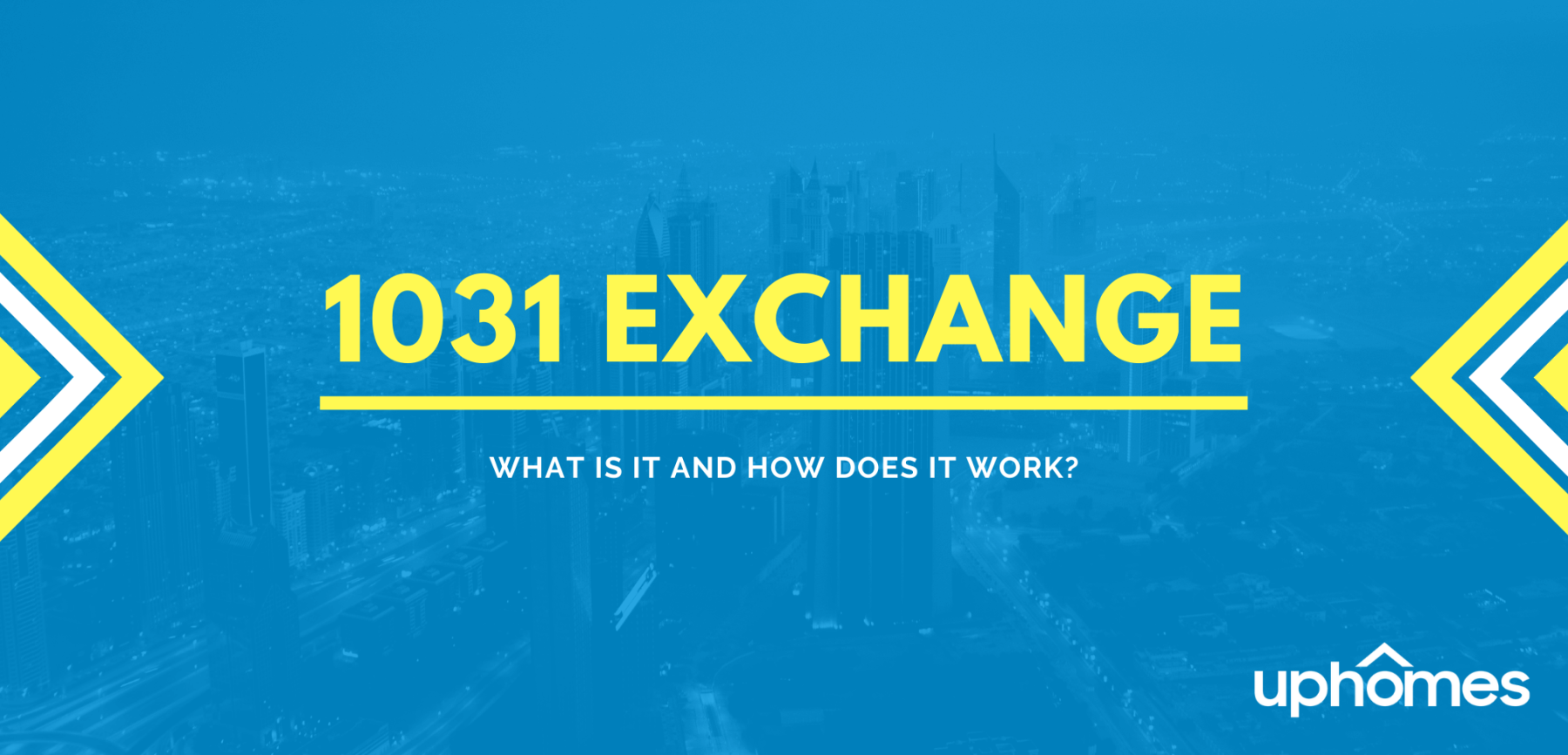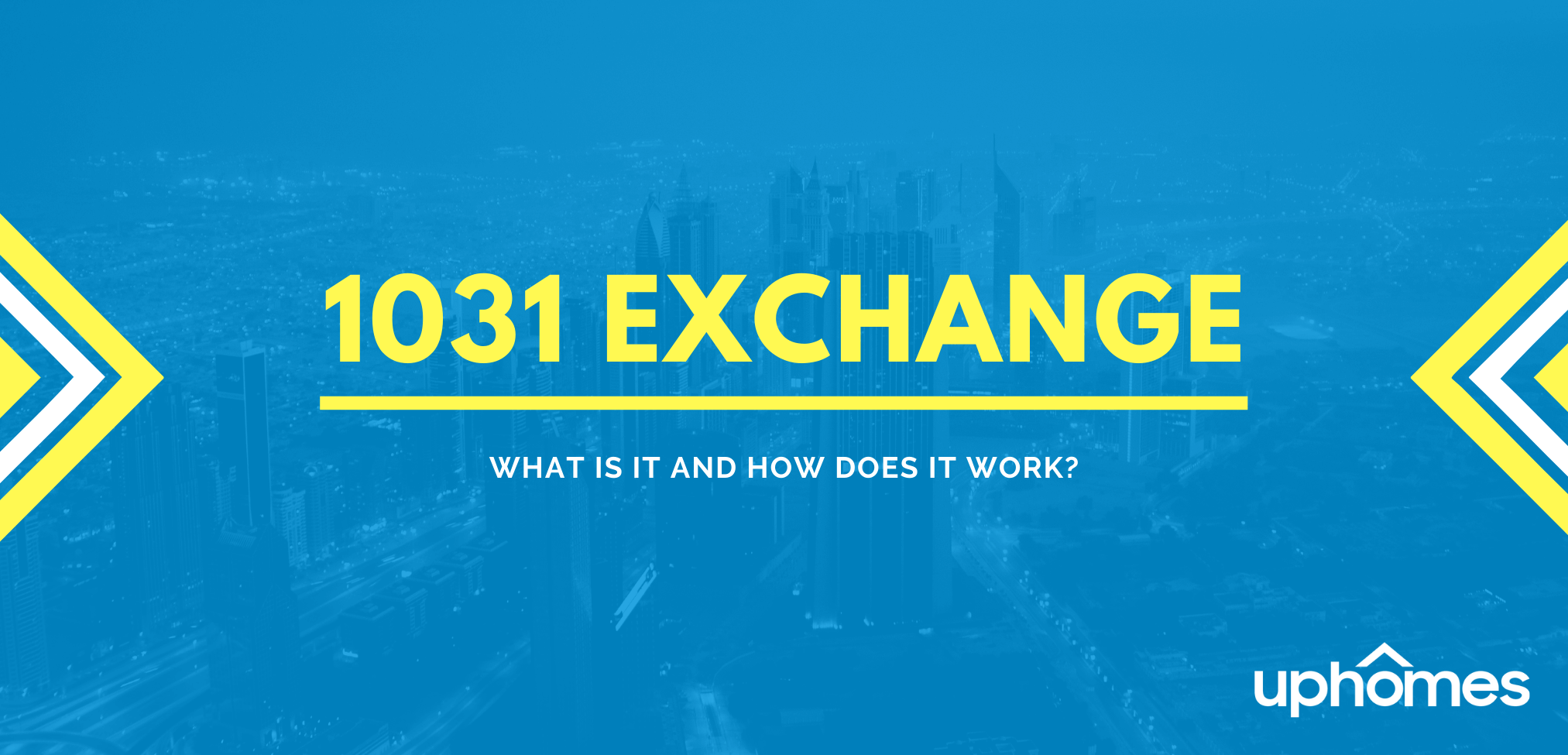September 26th, 2020

1031 Exchange

A 1031 exchange is one of the best tax-saving tools in real estate and in order to execute it correctly you will want to be sure to speak with a Certified Public Accountant (CPA) and read through everything you can on 1031 Exchanges!
There are several tax benefits to investors who participate in a 1031 exchange. When executed within the required deadlines, the 1031 exchange is a great way for investors to defer both depreciation recapture and capital gains tax. However, as with most tax benefits, the 1031 exchange can be quite complex.
In this article, we’ll discuss how the 1031 exchange process works, which properties are eligible, and who can help execute the exchange.
What is a 1031 exchange?
Derived from Section 1031 of the U.S. Internal Revenue Code, a 1031 exchange allows real estate investors to defer paying capital gains taxes when they sell an investment property. When an investor participates in a 1031 exchange, they sell one investment property (or properties) and reinvest the income from that sale into a second property (or properties) of equal or greater value within a certain period of time. Because the investor doesn’t receive proceeds from the sale, they do not have to pay income tax. The 1031 exchange is ideal for investors who can close on a sale within a short period of time and seek to keep their funds in an investment. A 1031 exchange can also be executed using a portfolio of properties, if applicable. They can then reinvest the funds into a single property or a second portfolio of properties. For example, an investor may choose to sell five retail spaces for one large apartment complex or one warehouse for three retail properties (investors may sell as many properties as they want but can only purchase up to three properties in exchange when executing a 1031 Exchange).
If you want to keep some of the proceeds from the sale of your property and don’t want to put 100% of the funds into a second property, you can do a partial 1031 exchange. This involves selling an investment property, keeping part the sale proceeds, and reinvesting the rest into a second property. For example, if you sell a $900,000 property but need $100,000, you can put $800,000 towards an investment property and will pay depreciation recapture and capital gains tax on the $100,000.
What are the benefits of executing a 1031 exchange?
Owning an investment property is a great way to earn additional income and often has several long-term benefits. However, when an investor chooses to sell their current investment property and purchase a new one, they will pay a considerable amount in real estate taxes. By participating in a 1031 exchange, a real estate investor can defer taxes on a smaller property and invest in a property of equal or larger value without taking a major tax hit. It is also great for investors who are interested in selling a property in one location and reinvesting those assets into a different property elsewhere.
In addition to deferring taxes, you may also be able to defer some or all depreciation recapture tax liability. Investors pay depreciation recapture tax when the asset exceeds the adjusted cost basis. According to the IRS, the depreciation period of a residential rental property is 27.5 years, and the depreciation period of a commercial property is 39 years. To assess depreciation recapture, the IRS takes the difference between the sale price of the property and the adjusted cost basis or the tax basis.
How long can I defer taxes in a 1031 exchange?
A real estate investor can technically defer taxes indefinitely if they choose. To do this, every time the investor sells a property, they must reinvest the assets from the sale of the property into a new investment property through a 1031 exchange. Investors can hold an investment property as long as they want and continuously complete 1031 exchanges every time they sell a property indefinitely to avoid paying taxes.
Can any property be used in a 1031 exchange?
In order for a property to be used in a 1031 exchange, it must be an income-producing investment property. Personal residences are not eligible to be used in a 1031 exchange. The property being sold must be replaced with a “like-kind” property, meaning it is also an investment-producing property used for use in a business, trade, or investment. Fortunately, investors are not tied down to only one property type when executing a 1031 exchange – they can sell retail space and purchase an apartment building or warehouse in its place if they choose. As long as the new investment property being purchased is of equal or greater value to the property being sold, it is 1031 exchange eligible. Examples of investment properties include an apartment building, a warehouse, retail space, etc. Additionally, the property owner cannot execute the 1031 exchange on their own – they must hire a Qualified Intermediary.
What is a Qualified Intermediary?
Also referred to as an ‘Accommodator’ or ‘Facilitator’, a Qualified Intermediary is a neutral third party who has no direct benefit in the 1031 exchange taking place. They are responsible for acquiring the property being sold in the 1031 exchange, holding the funds used for the transaction, and transferring the property over to the buyer.
The Qualified Intermediary helps facilitate a smooth transaction experience and is meant to keep the funds safe. The person cannot be personally connected to the seller in any way to ensure all aspects of the transaction are neutral and the Qualified Intermediary will not have any bias when facilitating the transaction. As a result, if the individual has the following relationship with the property owner, they cannot act as a Qualified Intermediary for that individual:
They cannot serve as a Qualified Intermediary if they have been the taxpayer’s employee, real estate agent, broker, investment banker, attorney, or accountant within the past two years. In addition to financial connections, an investor also cannot ask siblings, spouses, ancestors, or descendants to act as their Qualified Intermediary.
How much time do you have to complete a 1031 exchange?
The 1031 exchange timeline is extremely short, making it difficult for some investors to complete a 1031 exchange within the limited deadlines. When a seller decides to sell their investment property, they have 45 calendar days (not business days) to identify the second property they wish to purchase. During this timeframe, you can identify up to three properties you’re interested in purchasing. If the first property you’re interested in doesn’t end up working out, you will have the second and third properties to fall back on. You then have only 180 days to close on the property. If you are unable to identify a property within the 45-day deadline, your property will fall out of the 1031 exchange and you will have to pay capital gains tax and depreciation recapture tax should you choose to move forward with selling the property.
How does a 1031 exchange affect the seller?
If you are in the process of selling an investment property and recently learned that your buyer plans to execute a 1031 exchange, you may have several questions on how this will affect you. It is important to include language in your contract specifying that working with a buyer in a 1031 exchange will come at no additional cost to you. Unlike a traditional property sale, a third party – a Qualified Intermediary – will be responsible for holding the buyer’s funds they’ll use to buy your property (referred to as “proceeds”). The Qualified Intermediary will be responsible for sending you the funds when the property closes. Include language in your contract acknowledging that you’re aware the buyer has assigned certain rights to the Qualified Intermediary.
The process on how to execute a 1031 exchange:
1. Discuss the 1031 exchange process with your accountant
While a 1031 exchange comes with several benefits, it is not the best course of action for every investor. The short timelines may lead some owners to rush into purchasing a new property quickly without fully vetting the property, leading to expensive problems down the line. Additionally, there are costs associated with executing a 1031 exchange, such as hiring a Qualified Intermediary, etc., so it is important to ensure that the financial benefits of completing a 1031 exchange outweigh the cost of completing the exchange itself. Have a thorough conversation with your accountant to ensure the 1031 exchange is the best course of action and will have the highest financial benefit for you.
2. List your investment property
Your real estate agent will list your investment property for sale following the same process when selling any property, but they will include language in the paperwork regarding your intent to execute a 1031 exchange so that prospective buyers are aware.
3. Hire a Qualified Intermediary
Interview various Qualified Intermediaries or ask your accountant, attorney, or real estate agent who they recommend. Your Qualified Intermediary will help the 1031 exchange process move smoothly, so it is important to go with a company with a strong reputation that has facilitated several exchanges in the past.
4. Assign the contract to the Qualified Intermediary
Have your real estate agent add an addendum to your contract that allows the property to be relinquished to your Qualified Intermediary. Send the contract to your Qualified Intermediary as soon as you can.
5. Sell your current property (or portfolio of properties)
Sell your current property, or properties, and send the proceeds from the sale to your Qualified Intermediary. The Qualified Intermediary will then put the proceeds into an escrow account and the 45-day identification period begins.
6. Identify 3 properties within 45 days
If you are selling more than one property in the exchange, the 45-day identification period begins when the first property sells, so time is of the essence. During the 45-day period, you can identify up to three replacement properties you’re interested in purchasing. You will then have to send a detailed letter describing each property to your Qualified Intermediary. Have two backup properties in mind in the event that the first property you want doesn’t work out. You are not responsible for purchasing every property you identify, so it is ideal to have a few others in mind as backup options.
7. Execute the contract and send to your Qualified Intermediary
After your real estate agent executes a contract on the replacement property, send it to the Qualified Intermediary so that they can begin preparing the necessary paperwork. Your Qualified Intermediary will then ask you to sign an assignment contract for the new property.
8. Close on the replacement property within 180 days
Close on the new property within 180 days of the sale date of the original property. Closings often get delayed so closing within this timeframe can be challenging, but going past the 180 days will unfortunately mean you can no longer execute a 1031 exchange on that property. The Qualified Intermediary will send the funds for the sale to the buyer and will provide you with a breakdown on how the proceeds were distributed.
9. File Form 8824 with the IRS
File Form 8824 with your tax return for the year when the original property was sold. This form reports the exchange to the IRS. This is one of the steps that you may want to ask for help from a certified public accountant who can walk you through the proper procedures.
Final Thoughts on 1031 Exchange:
If you're executing a 1031 exchange you need to be sure you're doing each step correctly or you may find yourself penalized and having to pay taxes on what you thought you may otherwise not have to. A 1031 exchange is a very complex maneuver in the real estate world and its one that you will want to collaborate with a CPA on or an industry professional that can guide you through each and every step. A 1031 exchange, if executed correctly can be one of the best things you do in your real estate investing career!
It's important to remember that this article is to help you understand what a 1031 Exchange is and that a CPA should always be consulted when it comes to anything tax-related, especially something like 1031 exchanges! With that being said we hoped you enjoyed our article on 1031 exchanges and please feel free to share or link to our article from your website if you believe it will be helpful or useful to others!

Ryan Fitzgerald
Hi there! My name is Ryan Fitzgerald, and I am a REALTOR®. My goal is to help you learn more about real estate through our Real Estate Blog! Hopefully, you enjoyed the above blog post and it found a way to provide help or value to you. When you're ready to buy or sell a home of your own let us know here. Please feel free to join the conversation by dropping us a comment below.

